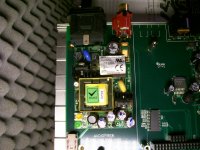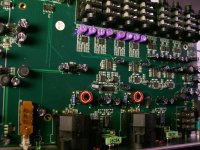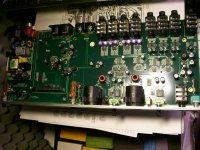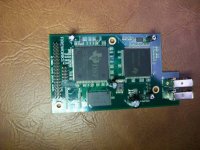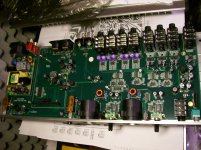I need to replace all electrolytics in my sound card Echo Audio Fire 8
I posted some photos .
I already ordered over 60 caps but some of them have higher voltage tolerances ,
For example instead of 100uf 6,3v I will receive 20 caps having 100uf 10v .
Is there any problem if some have higher voltage tolerance ?.
I don't want to damage the board .
Also to replace all caps seems a very delicate complicated operation because the traces are very tiny and fragile .
Cheers
I posted some photos .
I already ordered over 60 caps but some of them have higher voltage tolerances ,
For example instead of 100uf 6,3v I will receive 20 caps having 100uf 10v .
Is there any problem if some have higher voltage tolerance ?.
I don't want to damage the board .
Also to replace all caps seems a very delicate complicated operation because the traces are very tiny and fragile .
Cheers
Attachments
A higher voltage rating isn't a problem. Do you really *need* to replace all of them? I would be very careful replacing caps in the SMPS. First, the caps have to have at least the same ripple current rating. Second, the performance could be affected if you use a drastically lower or higher ESR cap.
The lead spacing and size should be the same or close so they actually fit, though. If you have to have excessively long leads to fit them, it's not great.
The lead spacing and size should be the same or close so they actually fit, though. If you have to have excessively long leads to fit them, it's not great.
Last edited:
ThanksA higher voltage rating isn't a problem. Do you really *need* to replace all of them? I would be very careful replacing caps in the SMPS. First, the caps have to have at least the same ripple current rating. Second, the performance could be affected if you use a drastically lower or higher ESR cap.
I checked some caps and they are almost dead . Those are some trash china caps marked "Rec" or "Trec" almost all of them . I ordered some Nichicon FG to replace those .Regarding the psu I will check the ripple of the new caps . I ordered some high quality parts . I was never happy with this board . The sound was not that great .
The power supply is a CFM1503S .Maybe those caps on PSU are ok and don't need replacement .
Seems very risky to mess with the ripple rating .
Just be mindful of replacing regular electrolytics with solid polymer caps like OSCONs or similar, just in case the designer was counting on some ESR for damping behavior.
If they are really cheap generic electrolytics you will probably not have any issues with ripple current ratings. I would imagine almost everything you replace them with will be equivalent or better. I would not use Nichicon FG for the power supply though. They are not really meant to be in a switching power supply, though they might still be better than the generic Chinese caps.
If you're able to fit them, look into the Nichicon Muse ES bipolar caps for coupling positions.
If they are really cheap generic electrolytics you will probably not have any issues with ripple current ratings. I would imagine almost everything you replace them with will be equivalent or better. I would not use Nichicon FG for the power supply though. They are not really meant to be in a switching power supply, though they might still be better than the generic Chinese caps.
If you're able to fit them, look into the Nichicon Muse ES bipolar caps for coupling positions.
Last edited:
If the cap is rated for a higher ripple current, that's better, just don't go lower. You don't know what the actual ripple current the capacitor experiences is unless you measure it or you're the designer.
Phase is right, I meant don't replace a standard electrolytic with a polymer if you don't know anything about the circuit. Chances are it will be fine, might even be an improvement at the output of the power supply, but it could also make things worse.
I'd probably not replace any caps if the unit still works well though... I recapped an EMU 1820m but only because half of the caps in it literally all go bad and vent after a few years of use. I wouldn't have touched it had it not stopped working though.
Phase is right, I meant don't replace a standard electrolytic with a polymer if you don't know anything about the circuit. Chances are it will be fine, might even be an improvement at the output of the power supply, but it could also make things worse.
I'd probably not replace any caps if the unit still works well though... I recapped an EMU 1820m but only because half of the caps in it literally all go bad and vent after a few years of use. I wouldn't have touched it had it not stopped working though.
Last edited:
But the ripple is important only for PSU caps right ?. Regarding the chinese caps on the board outside the PSU I don't know the ripple specs of those .
I hope that changing those damaged caps with new caps will bring more extension and depth to the music.
On the board it is written 2005 and most of the caps are already almost dead but I think the PSU caps are fine because on that I see only Japanese caps but I will also measure those.
I hope that changing those damaged caps with new caps will bring more extension and depth to the music.
On the board it is written 2005 and most of the caps are already almost dead but I think the PSU caps are fine because on that I see only Japanese caps but I will also measure those.
Last edited:
But the ripple is important only for PSU caps right ?. Regarding the chinese caps on the board outside the PSU I don't know the ripple specs of those .
I hope that changing those damaged caps with new caps will bring more extension and depth to the music.
On the board it is written 2005 and most of the caps are already almost dead but I think the PSU caps are fine because on that I see only Japanese caps but I will also measure those.
Yes, the ripple current is hopefully only an issue for the caps in the power supply or at the input / output of any switching regulators if there are any.
I'm not sure they will make much audible difference, it depends on what dead means. Coupling caps should last for a very long time unless they are real garbage.
I already changed the smallest caps (those having Vloss between 5% to 10%) and the coupling output caps . The coupling measured ok but I replaced them with Nichicon ES the green one . Also I replaced some big caps with Nichicon FG and Panasonic FC FM .Yes, the ripple current is hopefully only an issue for the caps in the power supply or at the input / output of any switching regulators if there are any.
I'm not sure they will make much audible difference, it depends on what dead means. Coupling caps should last for a very long time unless they are real garbage.
I was never happy with the sound of this board .
Now it sound phenomenal . The depth and details has improved enormously. Also the sound is punchy and juicy .
I can't believe what I have missed my entire life .
I did not touched the Psu .
Also i MADE A MISTAKE one lead from the imput cap was in touch with the soundcard metal case so the input signal on channel 3 was full .I unplugged the card immediately and I trimmed all lead .
Now it is fine . I hope that nothing was damaged .
I already learned a lot and I can't believe how tricky those company are. They mess the sound of their soundcards by cutting the production costs using those crap caps.
But what about ESR ? ESR is only important for the power supply voltage regulators to not go very low ?. Should I be careful to not put any low ESR cap on the PSU ?.Yes, the ripple current is hopefully only an issue for the caps in the power supply or at the input / output of any switching regulators if there are any.
I'm not sure they will make much audible difference, it depends on what dead means. Coupling caps should last for a very long time unless they are real garbage.
What about the rest of the board ?. There is any chance that a low ESR cap would not be allowed in other parts of the board ?.
I already replaced 60% of the REC LZ 105 degree and REC SR 85 degree and those where all with bad Vloss all having between 4% to 10% Vloss.
Now the sound is much better but I think I lost some volume . With the broken caps the volume was more loud at the same settings . May be because of the bad Vloss of those RECs injecting more current ?
Hi robert2017,
You are really asking questions that a seasoned designer would take decades to learn well. Now I am certain that you have not lost any volume level at all. If you were worried about this, you should start these jobs by measuring the actual levels, and also the distortion. Then measure when you are done. That way you have actual proof and you no longer need to worry about what you might be imagining.
Humans are terrible instruments. We are good at making quick comparisons, and long term judgements like "I like it" or "sounds worse". But the questions you are asking won't be answered with a short term listening test. You really do need to make some measurements. The more detail you want, the more expensive your test bench will be. For example, after reading a number of your posts, you would need top of line equipment to answer your questions and assertions. So something like the Keysight U8903B, that's around $35K American for what I want. On the low end, an RTX 6001 which is only about $2,500 plus software (call that $500 for M.I.). Anything less is just a personal opinion.
You can test sound cards with another really good sound card, but not amplifiers and some preamps. Those can easily blow up a sound card. Start saving your pennies and put them towards answering your questions in a clear and accurate way. Contrary to what we had in the 70's and 80's, today's test equipment, properly used can measure what you can hear, and stuff you can't hear. If you only knew!
-Chris
You are really asking questions that a seasoned designer would take decades to learn well. Now I am certain that you have not lost any volume level at all. If you were worried about this, you should start these jobs by measuring the actual levels, and also the distortion. Then measure when you are done. That way you have actual proof and you no longer need to worry about what you might be imagining.
Humans are terrible instruments. We are good at making quick comparisons, and long term judgements like "I like it" or "sounds worse". But the questions you are asking won't be answered with a short term listening test. You really do need to make some measurements. The more detail you want, the more expensive your test bench will be. For example, after reading a number of your posts, you would need top of line equipment to answer your questions and assertions. So something like the Keysight U8903B, that's around $35K American for what I want. On the low end, an RTX 6001 which is only about $2,500 plus software (call that $500 for M.I.). Anything less is just a personal opinion.
You can test sound cards with another really good sound card, but not amplifiers and some preamps. Those can easily blow up a sound card. Start saving your pennies and put them towards answering your questions in a clear and accurate way. Contrary to what we had in the 70's and 80's, today's test equipment, properly used can measure what you can hear, and stuff you can't hear. If you only knew!
-Chris
So if almost all caps have wrong bad Vloss this can make the soundcard to sound with more volume compared to the same sound card using good healthy caps using the same volume settings ??That and distortion can make it sound subjectively louder.
I have a cap tester that works great . Is pretty accurate for small caps but don't work that great with huge reservoir caps .What are you calling Vloss and how are you measuring it?
-Chris
- Status
- This old topic is closed. If you want to reopen this topic, contact a moderator using the "Report Post" button.
- Home
- Source & Line
- Digital Line Level
- Replacing capacitors in soundcard Echo AudioFire with bigger caps 8
